Development Cost Charges (DCCs) are fees collected from developers at the time a building permit is issued or a subdivision is approved for a new development. These fees help municipalities to offset the capital cost of infrastructure and services needed to support growth in the community, such as transportation, water, sewer, stormwater, and parks. Recent changes to provincial legislation now allow DCCs to fund services like fire halls, police stations, and solid waste and recycling facilities.
Development Cost Charge Bylaw
The City’s current Development Cost Charge Bylaw came into effect in 2016. The collection and usage of DCCs are legislated under the Provincial Local Government Act and the accompanying DCC Best Practices Guide, which outlines project eligibility requirements.
The information provided on this webpage is meant to give you a general idea of the City’s DCCs. If you're planning a building or development project, be sure to check the official bylaw or speak with the City's Planning Division to find out exactly what charges may apply to your specific situation.
Changes to our development charges
Since the City's existing bylaw came into effect in 2016 much has changed, including significant increases in construction costs, the introduction of new development standards, and the inclusion of additional DCC-eligible services that are not covered under the current DCC bylaw. The City of North Vancouver is growing quickly, so it needs more investment in infrastructure like roads, transit, and services to help build a complete, livable community.
Proposed DCC rates
The following summarizes the proposed DCC rates based on DCC eligible service in the City of North Vancouver. The new DCC rates will come into effect with the adoption of the new bylaw updates. The City will provide a 12-month in-stream protection period for complete applications, starting from the date we adopt the new bylaw.
| Land Use |
Proposed DCC Rates |
Unit |
| Single Family Units |
$17,747 |
per dwelling unit/lot |
| Multiple Unit (townhouses, rows, units with basement suites) |
$14,844 |
per dwelling unit |
| Apartment 5+ Storeys |
$10,304 |
per dwelling unit |
| Other Apartments (less than 5 storeys, suites, small-scale) |
$12,593 |
per dwelling unit |
| Commercial |
$148.26 |
per m2 |
| Industrial |
$110.37 |
per m2 |
* Based on average townhouse of 139m2 and apartment of 65m2.
Frequently asked questions about development charges
How do our proposed DDC Rates compare to our neighbours?
A comparison of DCC rates between the proposed rates for the City of North Vancouver and selected Metro Vancouver municipalities are provided below. The rate comparison includes the applicable Regional, TransLink and local DCC rates.
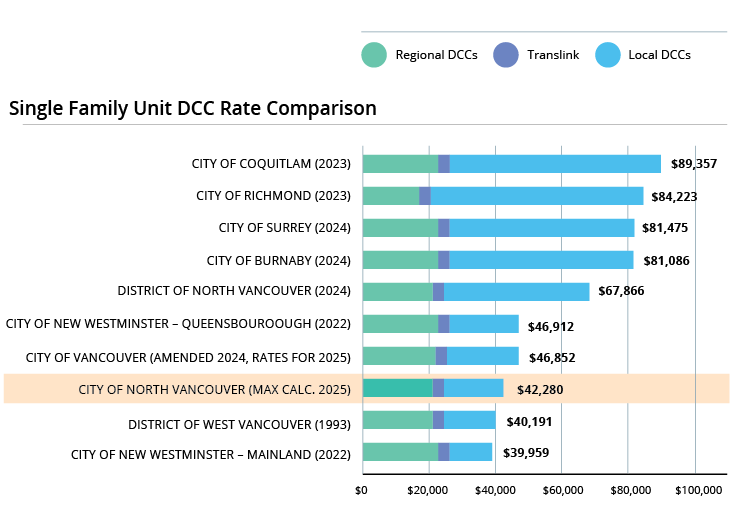
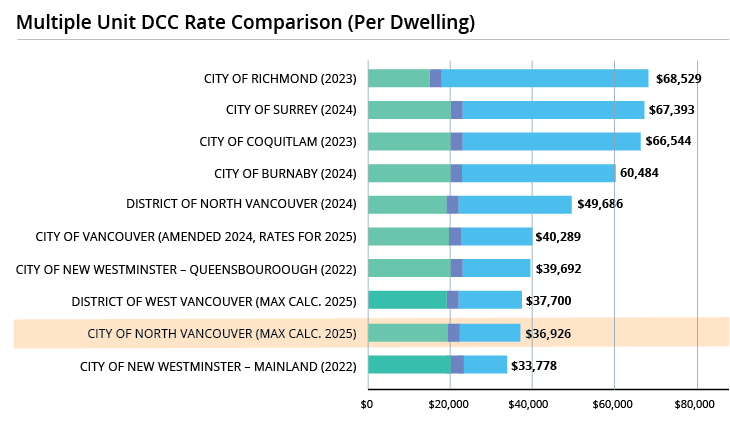
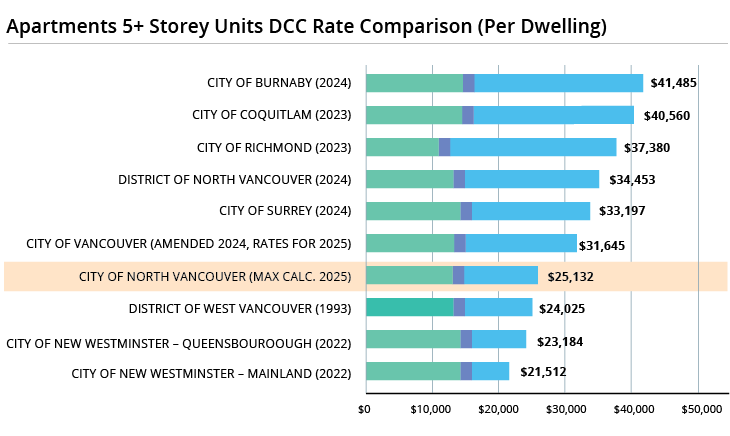
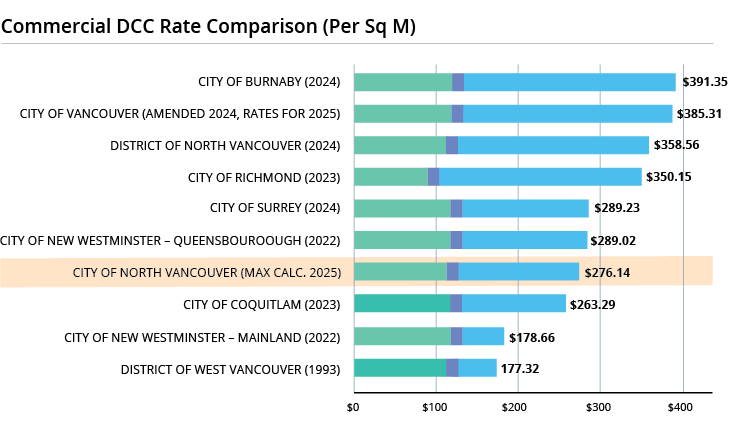
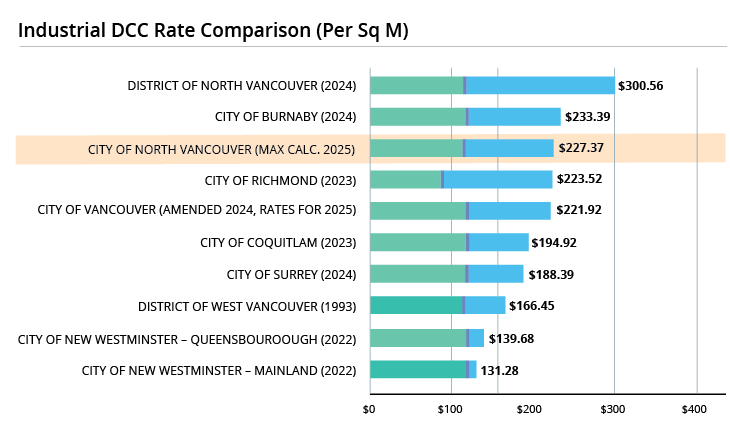
What are the City's current development charge rates?
The City of North Vancouver collects three types of DCCs:
City DCCs
Charged for the purpose of providing funds to assist the City with general road and infrastructure projects and in acquiring parkland. Read more in Development Cost Charges Bylaw 8471 (PDF).
Metro Vancouver DCCs
Charged for the Greater Vancouver Sewerage and Drainage District (GVS & DD) to help finance the cost of various sewerage projects within Metro Vancouver. Get details on the Metro Vancouver website.
TransLink DCCs
Charged for new developments in the Transportation Service Region to help fund the construction or expansion of projects in TransLink’s Investment Plans. Learn more on the TransLink website.
Existing and Proposed DCC Rates
The fees payable for all City of North Vancouver DCCs are outlined in the table below. Please note that the DCCs for commercial and industrial developments are measured in square metres for the City of North Vancouver, whereas Metro Vancouver and TransLink DCCs are measured in square feet.
| Land Use |
Existing DCC Rates (2016) |
Proposed DCC Rates |
Unit |
| Single Family Units |
$14,749 |
$17,747 |
per dwelling unit/lot |
| Multiple Unit (townhouses, rows, units with basement suites) |
$8,642 |
$14,844 |
per dwelling unit |
| Apartment 5+ Storeys |
$4,041 |
$10,304 |
per dwelling unit |
| Other Apartments (less than5 storeys, suites, small-scale) |
$4,041 |
$12,593 |
per dwelling unit |
| Commercial |
$58.03 |
$148.26 |
per m2 |
| Industrial |
$38.70 |
$110.37 |
per m2 |
* Based on average townhouse of 139m2 and apartment of 65m2.
What services do DCCs help pay for?
Development cost charges help pay capital costs for municipal services that support our community as it grows, including:
- Transportation: including the mobility program, city lighting program and master transportation planning work
- Parks: including future parkland acquisition, the greenways program, and improvement of new parks, plazas and sport fields
- Protection Services: plans to redevelop and expand the existing firehall
- Water: watermain replacement and upgrades
- Sanitary Sewers: replacement and upgrades of existing utility mains and pump stations
- Storm Drainage: focuses on storm utility main replacement and system upgrades
- Solid Waste & Recycling: including expansion of municipal spoil site / transfer station
As regional entities, Metro Vancouver and TransLink also collect DCCs on new developments located in the City of North Vancouver to offset the cost of regional infrastructure. These are calculated and charged separately from the CNV’s DCC program.
Who pays development charges?
DCCs are paid by development applicants for:
- Subdivision approval to create new residential lots for single detached homes.
- Building permits for multi-family, commercial, and industrial developments.
There are several projects that are exempt from paying DCCs, along with other exemptions required under the Local Government Act. For a fulsome list of exemptions, please contact the City’s Planning Division.
How are DCCs calculated?
DCCs are based on how much new growth is expected over a set period and the cost of services needed to support that growth. Elements of the calculation include:
- A 10-year forecast of housing, population and non-residential growth for the City of North Vancouver
- Technical infrastructure plans which identify projects required to service anticipated development over then next 10 years
- Capital cost estimates based on recent studies and project tenders
- The portion of costs specifically tied to growth-related needs
Costs are then allocated between residential and non-residential land uses based on the anticipated demand for services.
Contact Us
For more information, please contact:
Planning Division
Tel: 604-982-WORK (9675)
Email: gateway@cnv.org